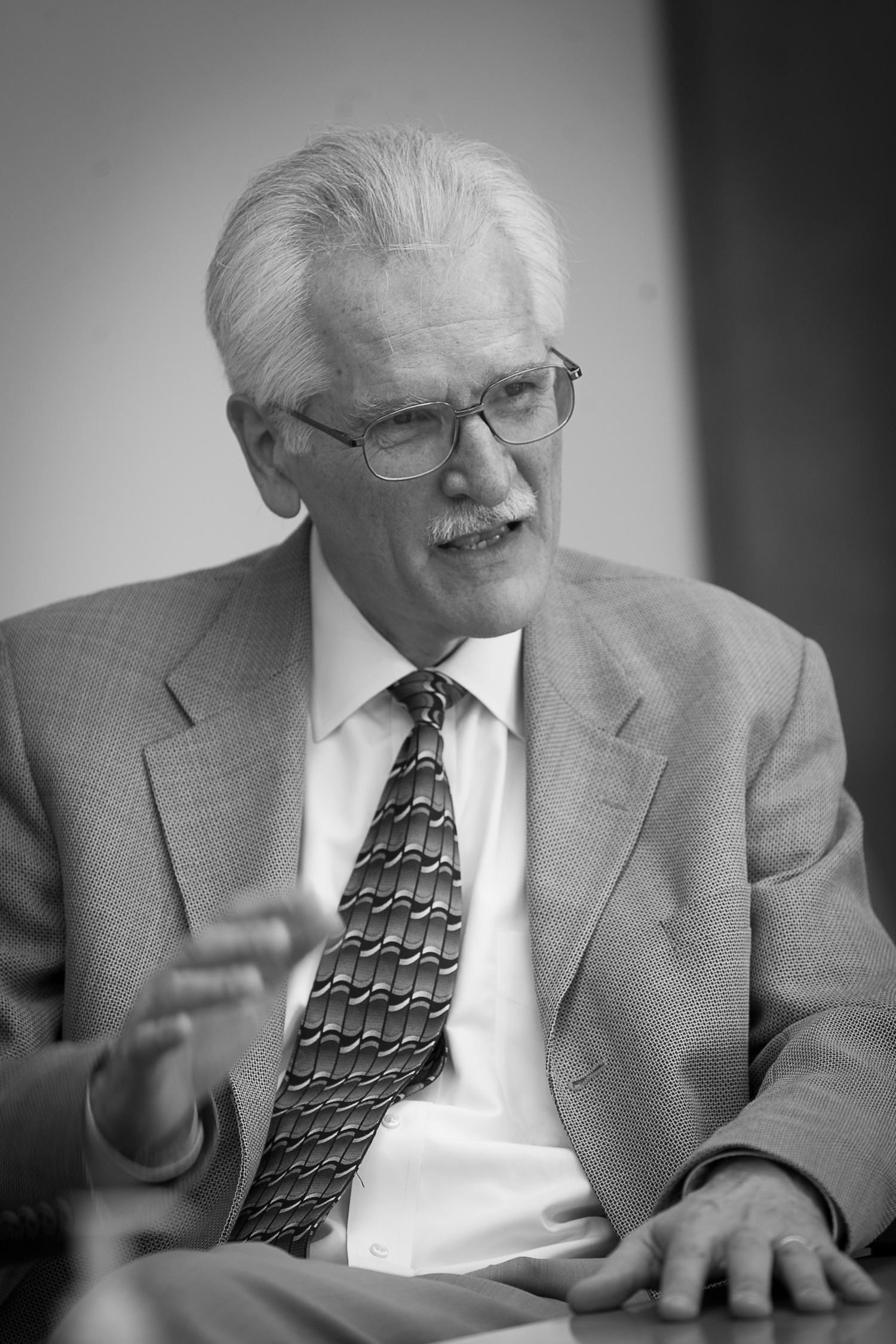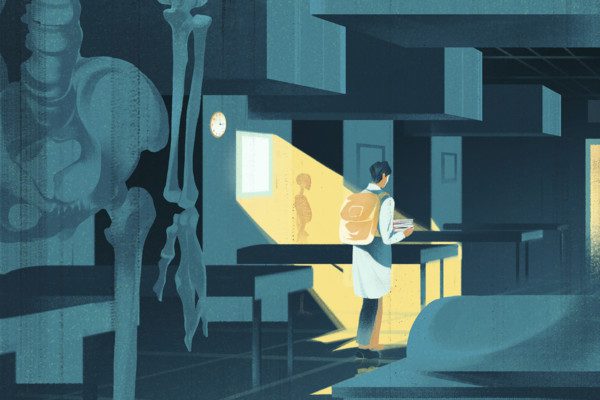Dr. Charles Czeisler has advised athletes and astronauts about the importance of sleep. Now, he’s turning his focus to college students.
For 30 years, Dr. Charles Czeisler has been studying the physiology of the human circadian clock which regulates the timing of sleep. As Chief of the Division of Sleep and Circadian Disorders at Brigham and Women’s Hospital, and the Baldino Professor of Sleep Medicine at Harvard Medical School, Dr. Czeisler has conducted volumes of research on sleep’s impact on health and human behavior. His latest work focuses on college students, a cohort that he believes is most at-risk for the short and long-term effects of interrupted sleep patterns and sleep deprivation.
This fall, students at a variety of colleges and universities will have the opportunity to take Sleep 101, an online course, developed by the Brigham Sleep Health Institute, on the importance of sleep in college. The course, with parallels to alcohol awareness and Title IX curriculum, educates students about the impact of their sleep habits on everything from their physical and mental health to their grade point averages. His urgency to share his vast knowledge and recent findings underscores his concern that sleep deficit in young people is mistakenly, and dangerously, underappreciated.
Mary Christie Quarterly: Why is this a critical time in the realm of sleep research?
Dr. Charles Czeisler: There is this ironic circumstance occurring right now regarding sleep. As we learn more about the adverse health and safety consequences of sleep deficiency, people are suffering more and more sleep deprivation and circadian disruption than ever before. We really have a public education crisis on our hands.
Technology is driving a lot of this: the artificially-lit phones and laptops, the 500 cable channels, the texting all night long. We’re now seeing disorders among students, that were only experienced by night shift workers, and we know how detrimental those schedules are on health. For young people this is even worse.
One of the biggest awareness problems is the myth that young people are more resilient to sleep deprivation than older people, when in fact they are much more vulnerable to the adverse effects of sleep loss. And it’s not a small difference. Our research shows that a young person kept up all night will have 5 to 10 times as many lapses in attention as an older person. They really fall apart in terms of performance.
MCF: Why is this the case?
CC: In younger people, the system in the brain which detects rising sleep levels and signals the transition from wakefulness to sleep is working at full capacity. This means that as sleep pressure rises, young people will automatically shut off. As we get older, this sleep “starter” deteriorates to the point where it is more difficult for us to transition quickly to sleep. It therefore becomes easier for older people to stay awake – the opposite of what is the common assumption.
What happens then is that young people, college students in particular, take massive amounts of caffeine that block the receptor in the brain that indicates that you are sleepy but it does not serve any of the functions of sleep which is to restore energy, to clear the toxins from the brain and to consolidate memory.
MCF: What has your research shown about sleep deprivation and sleep interruption in college students?
College students are a particularly vulnerable population when it comes to sleep deprivation, primarily due to shifts in their circadian rhythms (the physical, mental and behavioral changes that follow a roughly 24-hour cycle, responding primarily to light and darkness). But this is little known. We think of college kids as not needing sleep; and they think of themselves this way, so much so that they feel like failures if they can’t function without sleep. The truth is, sleep deprivation and circadian disruption in college students can create a downward spiral that leads to anxiety, depression, weight gain, and greater risk of a variety of health consequences and injury.
Sleep is critical for learning and memory. As one of my colleagues likes to say “We’re working on a word document all day long and it is during sleep that we press “save.” It is when we move things from short-term memory to long-term memory so we can retrieve them. Sleep is also when we rehearse things, during the deep slow-wave beginning stages of sleep; then we go into rapid eye movement (REM) sleep, which is the sleep stage associated with vivid dreaming. It is during REM sleep that we integrate the new memories we have just learned with everything we previously knew. That’s when we gain insight.
Almost half of the REM sleep we will get occurs in the last quarter of the night, so timing of sleep is critical. You need to be able to sleep in a consolidated, undisturbed block. That doesn’t happen when you’re waking yourself up to study for an exam or if you are interrupted by your roommate’s music. Consistency and timing have more impact than the number of hours. For example, if you get the same uninterrupted sleep every night, even if it’s six hours, your brain will adjust and preserve the REM sleep you need. But not if you’re sleeping till noon on weekends and napping in the afternoon, and then getting up at four on a Tuesday to work on a paper. Yet for many college students, inconsistency is the norm.
MCF: What are the consequences of this inconsistency?
That’s what our most recent research is all about. We studied sleep patterns among Harvard and MIT students, taking the 20 percent of students who had the most regular schedules and comparing them to the 20 percent who had the most irregular – people who stayed up all night, three or four times a week.
The regular sleepers were mostly sleeping at night, which is good because our brain depends on the timing of the light/dark cycle. If you have a regular schedule of light and dark exposure, your internal clock is in sync with your environment. If you have an irregular schedule, as many students do, your internal clock is set on average, about two and a half hours later which means they rarely get the higher quality “end-of-the-night” sleep their brains and bodies need. In addition, a 9 am class will be occurring at the equivalent of 6 am “brain time,” making it difficult for students to pay attention in class or perform well on tests.
Our research showed interesting and unfortunate consequences for the irregular sleepers, starting with lower grade point averages. The irregular schedules were also associated with much poorer scores on indexes related to mental health. We also found that the students who had the irregular schedules had higher rates of anxiety and depression. This was not unexpected, because we know that chronic sleep deficiency increases the risk for these disorders. For example, high school students who do not adhere to a regular bedtime have a higher rate of depression and suicidal ideation, as compared to those who do.
MCF: What about insomnia?
It’s all related. We are now seeing a significant percentage increase of young people being treated for depression, anxiety and sleeping disorders. The high prevalence of insomnia in today’s students is absolutely unprecedented, but not that surprising, given what we know. If you have an irregular schedule, this is going to create insomnia. If your circadian rhythm is out of synch, so is the surge time, or “second wind,” associated with that, so that when you try to fall asleep, you can’t.
If you’re tossing and turning because you can’t fall asleep and you have an exam in the morning, you are going to be a wreck. And it goes on from there. To make matters worse, you go to the student health center and get sleeping pills, which can be the start of a dependency, while also doing nothing to reset your circadian rhythm.
MCF: What can colleges and universities do to address this problem?
CC: I think everyone needs to acknowledge the dangers of an “all-nighter” culture that glorifies sleeplessness. Most schools have 24/7 food and coffee kiosks that serve energy drinks with 400 to 500 milligrams of caffeine. Meanwhile, 25 percent of college students say they regularly use Amphetamines as study aids so they can stay awake.
Structural changes can help. One of my students, a college athlete, said he appreciated the need for better sleep, but said his schedule just won’t allow it. His coach schedules off-season gym sessions at 5:15 in the morning so the players have time to work out before class. Another said that the only time the computer lab is regularly available for team projects was between 1:00 and 4:00 a.m. If we don’t address these institutional problems, we are fostering an environment that is harming our students’ health and their academic performance. It’s like providing alcohol at toll booths.
Education can be our number one asset when it comes to fighting sleep deprivation on campus, but we aren’t yet seeing enough of it. That’s why we developed Sleep 101 specifically for college students. When we were doing the research on college sleep patterns, I was shocked by how irregular some of these kids’ schedules were. When we began to show the correlation to poor performance and mental health, we said, “We need to convey this information to the students.”
Through a donation by Mary Ann and Stanley Snider, we were able to develop a pre-matriculation, interactive education module on the importance of sleep at college. Sleep 101 provides basic information about the benefits of sleep and the real dangers of poor sleep habits both at school and throughout life. We are also including the ability to track sleep and wakefulness patterns and receive feedback.
MCF: Are you hopeful that things will change on campus in regards to the sleep culture?
CC: The more information about the benefits of sleep, the better the chances are that kids will start to reverse these patterns. When upper class students learned how detrimental it was to lose and disrupt sleep, they asked me, “Why didn’t anyone tell us about this when we started college?”
In the reverse, I like to tell my students, “Think of sleep as your secret weapon.”




